1. Determining your funding requirements
Funding for climate justice can occur through processes, such as paying people with lived experiences to participate in governance and decision-making. The WA Primary Health Alliance has developed a Paid Participation Policy that can be used as an example for community service organisations (CSOs).
Other funding requirements could occur when integrating energy-saving appliances, water tanks, solar panels, insulation, water-saving tools, etc.
Based on your Climate Justice and Resilience Audit Tool and our Identified Climate Injustices in your Community, develop your climate justice action plan using the Toolkit to determine your funding and resource requirements.
2. Integrating climate justice work and costs into regular funding agreements, grants and tenders
Climate justice and resilience work needs money, resources, and time. To get this money, climate justice must be included in grant applications, funding plans, budgets, agreements, and tenders. Many aspects of CSO’s work overlap with climate justice. Understanding how climate justice fits with organisational values and frameworks can help find ways to include it in grant applications and budgets. Learning more about climate justice can show how it aligns with the organisation’s values, missions, visions, principles, and policies, making it easier to include in funding agreements, grants, and tenders.
Organisational ethical statements, vision and mission
Compare your organisational ethical statements, vision or mission with climate justice principles and values to determine where climate justice can be integrated into your current actions and funding streams.
Visit: Climate Justice Principles Tool
Organisational commitment to environment, social and governance (ESG)
There are several intersections of Environment, Social and Governance (ESG) and climate justice, such as social equity, participation and including historically marginalised voices and communities into decision-making processes and agency, transparency, enabling communities, ethical procurement and policy advocacy.
Organisational Commitment to the 17 UN Sustainable Development Goals
Climate justice intersects with the United Nations Sustainable Development Goals (SDGs) across various dimensions, emphasising the interconnectedness of social, economic, and environmental objectives. It contributes to poverty alleviation by safeguarding marginalised climate-vulnerable communities from climate impacts. It aligns with goals such as zero hunger, good health, quality education, and gender equality by addressing climate-related challenges. Climate justice supports clean water and sanitation, affordable and clean energy, and sustainable cities and communities, contributing to the well-being of populations. It aligns with the promotion of decent work, economic growth, industry innovation, and infrastructure that considers environmental and social impacts—additionally, climate justice advocates for responsible consumption and production patterns, biodiversity conservation, and resilient ecosystems. Overall, climate justice is inherent in the pursuit of sustainable development, fostering a more equitable and sustainable future for all.
Social Work Ethics
Australian Association of Social Workers (AASW) – Climate Action
AASW Declares a Climate Emergency. On their website, there is a list of how climate change.
“In line with our strategic plan, the AASW is deeply committed to working towards a sustainable and socially just environment through individual, cultural and structural change. As social workers, we work with communities who are hardest hit by climate change, and we appreciate that while climate change is affecting the entire population, the social, health and economic burden is falling most heavily on already vulnerable people.” (Source: AASW)
Eco-Social Work
“Eco social work – also referred to as ‘green social work’,
‘ecological social work’ or ‘environmental social work’ –
is concerned with how environmental issues affect people and communities.
That means things like extreme weather events and climate change.”
(Source: Charles Sturt University)
Podcast: Eco-Social Work
Religious values and missions
The Christian Climate Action lists its principles and values, highlighting the link between climate justice and Christian religious beliefs.
On the website of Young Evangelicals for Climate Action, you can find information on a mission statement and action pledge related to climate justice and evangelist faith.
Read more about religious groups and their views on Climate Change at Pew Research Centre.
3. List of grants and financing opportunities
In the following list, you will find several grant and funding opportunities for which you might be eligible. These resources can support your efforts in climate justice and resilience work:
- Disaster Resilience Grants – Department of Fire and Emergency Services
- Premier’s Natural Disaster Recovery Fund
- Community Grants | NAB Foundation – NAB
- The First Nations Clean Energy Network lists finance and funding opportunities.
- Finance and Funding Opportunities for Aboriginal and Torres Strait Islander households, communities and businesses to transition to renewable energy are listed on the First Nations Clean Energy Network Website.
- Funding Centre – Climate Change mitigation & response funding
- The Grants Hub Directory is an Australian online portal that lists several grant opportunities by sector (subscription fee applies)
- Climate Action Network Australia – CANA Grants offer a Small Grants Program to help build the capacity of the Australian Climate Movement.
- Groundswell is providing grants and funding for Climate Action.
- Disaster Ready Fund
Manage your environmental impact (Business.gov.au). This web page of the Australian government on Business provides additional details on how to ‘Manage your environmental impact’. It includes a guide to environmental management, links to each state and territory government’s requirements, and search links to environmental grants and awards.
Read more
Climate Justice a hot topic in record grants round (Victorian Legal Service Board & Commissioner)
Climate Change and Public Health: How Social Workers Can Advocate for Environmental Justice (Social Work Today)
Healthy, Regenerative and Just – Framework for a national strategy on climate, health and well-being for Australia (Climate and Health Alliance)
9 Actions That Will Help Your Company Support Climate Justice (Embedding Project)

